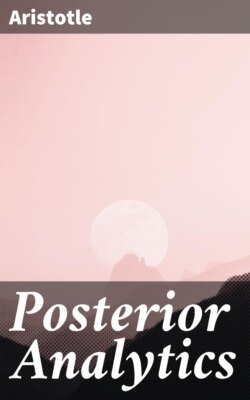Читать книгу Posterior Analytics - Aristotle - Страница 11
На сайте Литреса книга снята с продажи.
Chapter VIII: Demonstration is concerned only with what is eternal
ОглавлениеTable of Contents
The conclusion of a demonstration must be of everlasting application. Perishable things are, strictly speaking, indemonstrable. This applies also to definitions, which are a partial demonstration.
It is clear that if the premises from which the syllogism proceeds are universal, the conclusion of such a demonstration and of demonstration in general must be eternal. There is then no knowledge properly speaking of perishable things, but only accidentally, because the knowledge of perishable things is not universal but under restrictions of time and manner. When this is the case, the minor premise at least must be other than universal and must be perishable:—perishable because then the conclusion will contain a similar element, other than universal because then the predication will apply to some and not others of the subjects in question; so that no universal conclusion can be drawn but only one referring to this or that definite time. The same holds good with regard to definitions, seeing that definition is either the starting point of a demonstration, or itself a demonstration which differs from definition only in the way in which it is expressed or, lastly, in form a conclusion of a demonstration.
Demonstrations and sciences concerning things which occur only frequently (e.g. lunar eclipses) are clearly of everlasting application in so far as they are demonstrations, while in so far as they are not of everlasting application they are particular. As in the case of eclipses so is it with other subjects of the kind.
